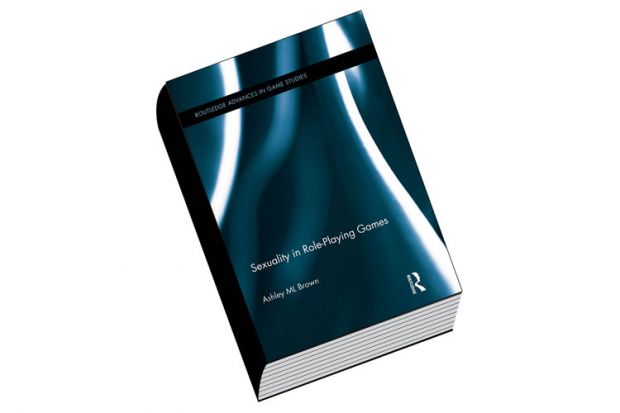It’s not often that you find descriptions of things such as “Savage Genitalia”, taken from a gaming book’s list of “special powers” and involving “fourteen-inch barbed penises”, in scholarly writing – but you certainly do in Ashley Brown’s well-written thesis. In this compact, precise work, she explores the interesting and sometimes libidinous world of erotic role play in table-top games such as Dungeons and Dragons and online gaming such as World of Warcraft.
With a few throws of a (possibly 20-sided) dice, Brown lays out sexy concepts such as the multiple framing of players’ roles in “bounded space”, and introduces the mechanism of “seduction checks” and developing affordances of “efficient sex” in game play. Perhaps inevitably, the book’s language is reminiscent at times of Sheldon Cooper’s in the ever-popular sitcom The Big Bang Theory, with sexuality, play and the notion of “fun” served up in a style as academically dry as a Rich Tea biscuit; nevertheless, each chapter is carefully honed and succinctly written. There is little in the way of tedious referencing, the appropriate theorists (Michel Foucault, Johan Huizinga, Roger Caillois, Sherry Turkle) are contextualised, and Brown’s research methodology – an ethnographic study of online and offline role players’ sexual eroticism, conducted through focus groups, interviews and game play – is well explained, ethically considered and executed.
Brown sees her work as different from “cybersex” research, although it might have been productive to explore the key discussions in cybersexology and offer a surer standpoint from which to contrast it with hers. Instead, she takes a more personal approach to the participants in her study, believing that an arm’s-length approach would hinder their responses rather than encouraging them “to feel comfortable and not to feel that they would be judged personally when discussing erotic role-play with me”. Accordingly, she creates a character for herself, a “Blood Elf holy priest”, and is able to mine some rich qualitative data via her own sexual in-game role play experiences. But in adopting such a character as a way to gain confidential responses from participants, she finds herself confronting the classic researcher’s dilemma about the pitfalls of becoming part of your own research.
There appears to be a slight sexual naivety on Brown’s part that surfaces during more personal descriptions – and a fairly ageist view of sexual activity through role play and play-as-sex generally. For example, “spin the bottle” was very popular in the 1970s among mature swinging couples (along with strip poker and naked Twister), rather than merely a game played by experimenting adolescents, as Brown suggests. More generally, though, we see her working hard to grapple with the problems that intimate sexual baggage brings to both online and offline discussions. She develops strong assessment, reflection and interpretation skills to qualify her arguments, and weighs the shortcomings of taking a binary approach to online and offline research.
On being invited to review this work, I fleetingly envisaged myself needing to sit outside a hobbit hole, reading about stereotypical geeks, wearing a hessian kirtle, pointy ears and big hairy feet in order to really get to grips with it. Fortunately, this wasn’t necessary. I am happy to say that this is an exemplary piece of academic work that is beautifully structured and makes a valuable contribution to the interpretation, exploration and future development of games studies.
Trudy Barber is senior lecturer and course leader for media studies and entertainment technology, University of Portsmouth.
Sexuality in Role-Playing Games
By Ashley M. L. Brown
Routledge, 156pp, £85.00
ISBN 9781138812550
Published 10 March 2015
